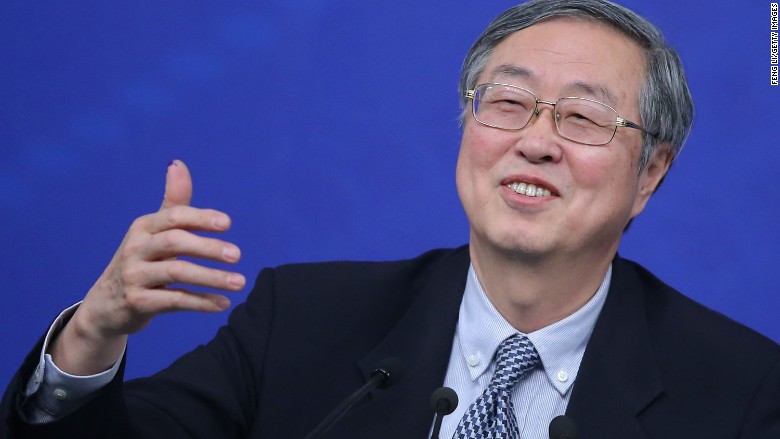
China is experiencing its slowest growth in 25 years, but the government is still holding fire on its giant stimulus bazooka.
"I personally expect that for now, we will continue to adopt a relatively prudent monetary policy, as long as there are no major international or domestic financial crises," Zhou Xiaochuan, governor of the People's Bank of China, said in a press conference on Saturday.
Zhou said he expected China to be able to reach its economic growth target for the year -- a 6.5% to 7% expansion of gross domestic product for 2016 -- without taking drastic action.
"We can achieve this goal without having to take additional measures," he said.
Zhou's words align with what many analysts have termed "the new normal" for China -- an era of slower economic growth, coupled with more prudent policies. It's certainly a different battle cry from the past.
Related: China sets growth target range of 6.5% to 7% for 2016
China, the world's second-largest economy, enjoyed breakneck growth over the years by investing in infrastructure and boosting exports. Whenever a hint of a downturn was hovering around the corner, the government would typically order credit lines open to fund more projects to boost the economy.
Experts have known for a long time that China's growth would slow. It had to weaken, in fact, as Beijing began launching reforms designed to shift the economy away from manufacturing, to one powered by consumer spending. Last year, China's gross domestic product expanded by 6.9%, it's worst pace in a quarter of a century.
Related: China credit rating outlook cut to negative over debt concerns
But if Beijing panicked and returned to its old playbook, that would mean debt levels for both businesses and local governments -- already at inflated levels -- would increase even further. More recently, the government has instead chosen to use smaller, targeted measures, rather than shock-and-awe stimulus, in order to support the economy.
For instance, in November 2014, China lowered its key rates for the first time in two years. Since then, it's moved several times to guide interest rates lower, and analysts largely expect this to continue.
But on Saturday, Zhou didn't comment specifically on the central bank's plans regarding future interest rate cuts. "Overall, on interest rate policy, we have to look at the whole economic situation, and the next set of related data," he said. "There are many factors to consider."
Zhou also said he felt the yuan had stabilized, and expected massive capital outflow to abate in the near term, which has already been reflected in recent data.
Billions of dollars have been pouring out of China in recent months as its economy has slowed and its currency has weakened. These so-called capital outflows have put even more downward pressure on the yuan, and Beijing has been trying to balance that by using its foreign currency reserves to buy more yuan.
The country's foreign exchange reserves shrank by about $29 billion in February to $3.2 trillion. That decline is much less steep than the alarming drops of $99.5 billion in January and $108 billion in December.


